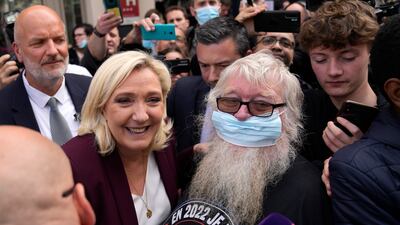France’s place in Europe has taken centre stage in the presidential election race as far-right leader Marine Le Pen denied suggestions from Emmanuel Macron’s camp that she would steer the country out of the European Union.
Allies of the president said Ms Le Pen’s policies would amount to a “Frexit” in all but name by restoring border checks, reversing economic integration and cutting France’s payments into EU coffers.
They sought to rally support behind the pro-European Mr Macron as the two candidates scramble for votes in the April 24 run-off, with 17 million ballots up for grabs from voters who supported other candidates in the first round.
Ms Le Pen denied a hidden agenda to leave the EU but says she wants to turn the 27-member bloc into a looser alliance and a “Europe of free and sovereign nations”.
Whoever wins the April 24 run-off will take on a leading role in guiding the EU’s response to the war in Ukraine, especially because France holds the rotating presidency of the European Council until July.
Mr Macron’s camp has seized on a record of Kremlin-friendly remarks by Ms Le Pen to portray her as unfit to take on such a prominent international role at a time of hostility with Russia.
Ms Le Pen, an ally of other Eurosceptic leaders such as Hungarian Prime Minister Viktor Orban, has sought to distance herself from Russian President Vladimir Putin since the war broke out.

Although Ms Le Pen has backed away from seeking a referendum on France’s EU membership, as she did in a previous presidential campaign, Mr Macron said on Wednesday that “the true face of the far right” remained unchanged.
Pieyre-Alexandre Anglade, a spokesman for Mr Macron’s party in parliament, said Ms Le Pen, who has spoken approvingly of Britain's withdrawal from the EU had a “hidden project of leaving Europe”.
“She doesn’t tell the truth to the French,” Mr Anglade said. “I don’t know any club where you can take part without paying your contributions.”
Another pro-Macron figure, Foreign Trade Minister Franck Riester, said Ms Le Pen’s policies would amount to the end of the EU’s single market.
Ms Le Pen, the nominee of the National Rally party, insisted she had “no hidden project “and told voters to read her 36-page election manifesto.
The manifesto does not propose a unilateral Frexit but says the EU should be “gradually substituted” with a looser alliance of nations, “bringing an end” to the idea of a federal Europe.
It calls for a referendum on an immigration overhaul proposed by Ms Le Pen in which new arrivals would be curbed, migrants more easily deported and foreign countries pressured to repatriate their nationals.
Ms Le Pen also wants to renegotiate the visa-free Schengen agreement, reverse integration into a common European electricity market and, separately from the EU’s institutions, pull France out of Nato’s joint military command.
Mr Macron also wants to reform Schengen but has championed France’s voice in Brussels and used his European Council presidency to project leadership on the international stage.
His pro-European stance helped win him an endorsement from former president Nicolas Sarkozy, who said Mr Macron’s experience was needed at a time of international crisis.
The president’s “European commitment is clear and unambiguous,” said Mr Sarkozy, from the centre-right Republican party whose candidate Valerie Pecresse was eliminated in the first round.
Mr Macron dismissed suggestions on Wednesday that the endorsement from Mr Sarkozy, an influential figure on the right despite his legal troubles, was part of any wider political agreement.
French media had speculated that Mr Sarkozy might have offered support to the president before legislative elections in June that could lead to Mr Macron’s party losing its majority in parliament.
But Mr Macron told France 2 television that although he would try to rally the support of political forces that don't “totally share my views”, there was no agreement with Mr Sarkozy.



























